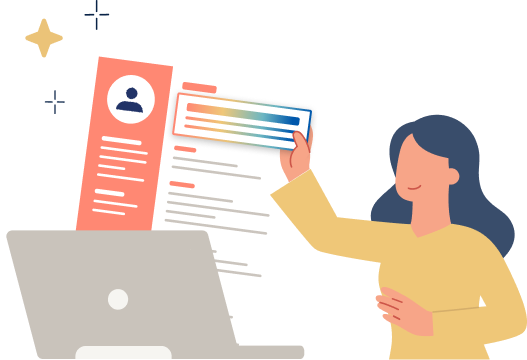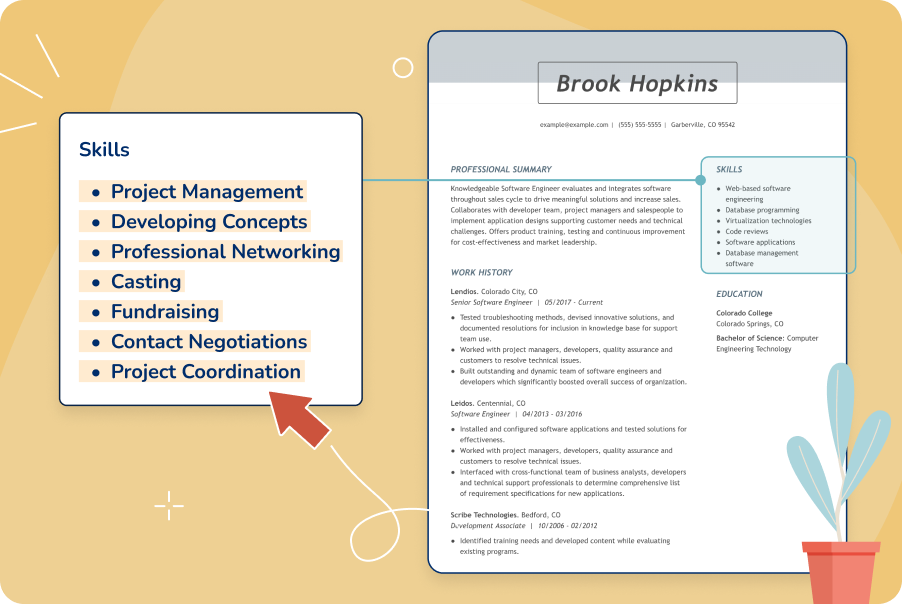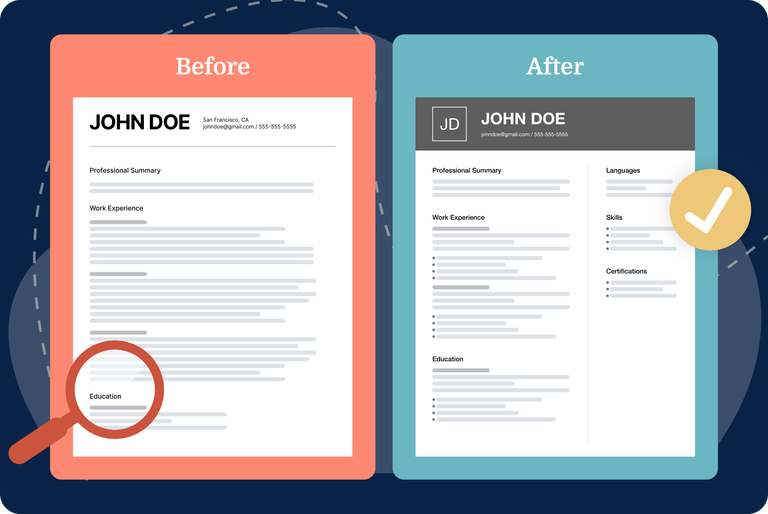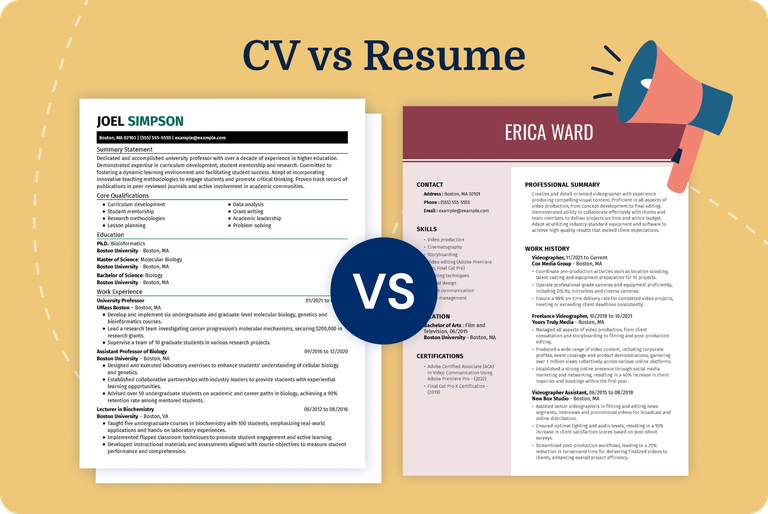Essential Language Skills for Your Resume (Examples & Tips)

Our customers have been hired at: *Foot Note
AI Resume Skills Generator

Language skills are crucial in today's globalized world. They enable effective cross-cultural communication, facilitate understanding and drive international business success.
We'll explore various examples of language skills and offer tips on showcasing them effectively on your resume to stand out in the competitive job market.
Browse the top resume language skills and how to develop them to advance your career. Read our guide on how to write a resume for tips and strategies to get started.
Ready to write your language-focused resume? Let our Resume Builder do the work for you. Simply answer some questions, and you will have a professional and effective resume in minutes!
What are language skills?
Language skills include proficiency in speaking, writing and understanding different languages to facilitate effective communication and cultural exchange.
These skills help bridge linguistic and cultural gaps, enabling individuals to engage meaningfully in international settings, support multilingual teams and enhance business relationships through effective communication.
In today's globalized economy, language skills are increasingly necessary for job success across various sectors. Businesses operate in diverse cultural contexts and seek professionals to facilitate cross-cultural communication, negotiation and collaboration.
Whether your job involves translation, interpretation, international relations or customer service, leveraging language skills effectively can distinguish you as a top performer and enhance your career prospects.
Add language skills to your resume using the template below or browse our library of resume templates to find your match.
Language skills resume example
Start your language skills resume with this example or explore our library of resume examples for more ideas on how to highlight your language skills in your resume.
Language skills for your resume
Employers value workers with proficiency in multiple languages, so the more languages you can showcase on your resume, the better your chances of getting your dream job.
Here are our picks for the top language skills to highlight on your resume:
Multilingual proficiency
- Speaking fluency: Ability to communicate confidently and effectively in multiple languages.
- Writing proficiency: Skill in composing clear and grammatically correct texts in different languages.
- Reading comprehension: Capability to understand and interpret written materials in various languages.
- Listening comprehension: Capacity to to comprehend spoken language accurately and respond appropriately.
Related guides:
- Bilingual Receptionist Resume Examples & Templates
- Bilingual Technical Service Agent Resume Example
- 5 Common Bilingual Customer Service Representative Interview Questions & Answers
Translation and interpretation
- Translation skills: Experience translating written texts from one language to another while maintaining accuracy and cultural nuances.
- Interpretation skills: Ability to translate spoken language orally in real-time, facilitating effective communication between speakers of different languages.
- Localization: Knowledge of of adapting content for different linguistic and cultural contexts to ensure relevance and effectiveness.
- Transcription: Skill in converting spoken language into written form accurately and efficiently.
See also:
Language teaching and training
- Language instruction: Experience teaching languages to individuals or groups, focusing on grammar, vocabulary, pronunciation and cultural aspects.
- Curriculum development: Ability to design educational materials and lesson plans that effectively teach language skills to diverse learners.
- Language assessment: Skill in evaluating language proficiency and identifying areas for improvement in speaking, writing, reading and listening.
- Online language tutoring: Experience providing virtual language instruction through platforms and tools that enhance remote learning.
Related guides:
- ESL Teacher Resume Examples & Templates
- Foreign Language Teacher Resume Examples & Templates
- Teacher Skills for Your Resume (Examples & Tips)
Language for specific purposes
- Business language proficiency: Knowledge of specialized vocabulary and communication norms in business and professional settings.
- Technical language skills: Effectively communicating about technical subjects or industries in different languages.
- Legal and medical language: Understanding terminology and communication requirements specific to legal and medical fields in various languages.
- Academic language: Using language skills for academic writing, research and communication within educational institutions.
Related guides:
- College Counselor Resume Examples & Templates
- Business Operations Resume Examples & Templates
- Technical Writer Resume: Examples and Tips
- Medical Office Assistant Resume Examples & Templates
Cultural competence and communication
- Intercultural communication: Ability to navigate and communicate effectively across different contexts, understanding cultural norms and sensitivities.
- Cross-cultural collaboration: Skill in working with multicultural teams and stakeholders, fostering understanding and cooperation.
- Cultural sensitivity: Awareness of cultural differences and ability to adapt communication and behavior accordingly to build trust and respect.
- Global mindset: Openness to diverse perspectives and willingness to engage in cross-cultural learning and adaptation.
Related guides:
Continuous learning and adaptability
- Learning agility: Willingness and ability to learn new languages, dialects and cultural nuances to stay current in the field.
- Adaptability: Capacity to adapt language skills to different cultural contexts, professional settings and organizational needs.
Language skills by industry
Employers value language skills in every industry. We’ve curated a list of sought-after language skills for top industries to help you boost your resume.
Accounting
- Financial statement translation.
- Cost-benefit analysis in multiple languages.
- Budget variance explanation in various languages.
- Forensic accounting analysis in different languages.
- Tax planning and analysis in multiple languages.
- Audit language analysis.
- Financial forecasting in various languages.
- Risk management analysis in different languages.
- Revenue recognition analysis in different languages.
- Cash flow analysis in different languages.
Related guides:
- Accounting Resume Examples & Templates
- Accounting Clerk Resume Examples & Templates
- Accounting Administrator Resume Examples & Templates
- Accounting Cover Letter Examples & Templates
Construction
Project cost estimation and analysis in multiple languages.
Schedule optimization in more than one language.
Resource allocation and utilization in various languages.
Risk assessment and management in different languages.
Quality control and assurance in various languages.
Vendor and supplier performance analysis in multiple languages.
Safety analysis in different languages.
Equipment maintenance analysis in multiple languages.
Environmental impact analysis in various languages.
Post-project analysis in different languages.
Related guides
- Construction Resume Examples & Templates
- Construction CV Examples & Templates
- Construction Cover letter Examples & Templates
- Construction Skills for a Resume (Examples & Tips)
Education
- Student performance analysis in multiple languages.
- Learning analytics in different languages.
- Assessment data analysis in various languages.
- Retention analytics in multiple languages.
- Educational data mining in different languages.
- Teacher effectiveness metrics in various languages.
- Budget and resource allocation analysis in different languages.
- Enrollment forecasting in various languages.
- E-learning analytics in different languages.
- Impact evaluation in various languages.
Related guides:
- Education Resume Examples & Templates
- Education CV Examples & Templates
- Education Cover Letter Examples & Templates
- Education Skills for a Resume (Examples & Tips)
Healthcare
- Patient health assessment in multiple languages.
- Health care analytics in different linguistic contexts.
- Analysis of medical data across various languages.
- Patient retention strategies in multiple languages.
- Medical data mining in different language settings.
- Physician effectiveness metrics in various languages.
- Budget and resource allocation analysis in diverse linguistic environments.
- Forecasting patient demographics and needs in various languages.
- Telemedicine analytics across linguistic boundaries.
- Evaluation of healthcare program impact in different language communities.
Sales
- Customer purchase behavior analysis in multiple languages.
- Sales performance analytics in different linguistic contexts.
- Analysis of sales data across various languages.
- Customer retention strategies in multiple languages.
- Market data mining in different language settings.
- Salesperson effectiveness metrics in various languages.
- Budget and resource allocation analysis in diverse linguistic environments.
- Forecasting sales trends and customer demands in various languages.
- E-commerce analytics across linguistic boundaries.
- Evaluation of sales campaign impact in different language markets.
Related guides:
- Sales Resume Examples & Templates
- Sales CV Examples & Templates
- Sales Cover Letter Examples & Templates
- Sales Skills for Your Resume (Examples & Tips)
Language skills by job title
Language skills are essential for professionals in various fields. They enable effective communication, cultural understanding and problem-solving skills.
Here, we’ve compiled customized lists of crucial language skills tailored to different job roles.
Accountant
Language skills enable accountants to interpret financial documents accurately, communicate effectively with international clients, and analyze financial data in diverse linguistic contexts.
Here are a few examples of language skills for your accountant resume to enhance employability:
- Financial document translation: Translating financial documents to ensure accuracy and compliance across languages.
- International client communication: Effectively communicating financial strategies and reports in multiple languages.
- Multilingual financial data analysis: Analyzing financial data in different languages to identify trends and optimize financial planning.
Related guides:
Customer service representative
Effective communication in multiple languages allows customer service representatives to understand customer needs, resolve inquiries efficiently, and enhance customer satisfaction.
Here are a few examples of language skills for your customer service representative resume to stand out:
- Multilingual inquiry resolution: Resolving customer inquiries in various languages to provide personalized solutions.
- Cross-cultural communication: Adapting communication styles based on cultural nuances to improve customer interactions.
- Language-based customer feedback analysis: Analyzing customer feedback in different languages to enhance service offerings.
Related guides:
- Customer Service Representative Resume Examples & Templates
- Customer Service Manager CV Examples & Templates
- Customer Service Agent Cover Letter Example & Templates
- Customer Service Skills: Examples and Tips for Your Resume
- 5 Common Customer Service Associate Interview Questions & Answers
Human resources manager
In addition to interpersonal skills, language proficiency equips human resources managers with the ability to engage with diverse teams, conduct international recruitment, and implement inclusive workplace policies.
Here are a few examples of language skills for your human resources manager resume to secure your ideal role:
- Multilingual conflict resolution: Resolving conflicts and fostering collaboration among diverse teams using multiple languages.
- International policy implementation: Developing and implementing HR policies that adhere to local regulations and cultural sensitivities.
- Language-based workforce analysis: Analyzing workforce demographics and trends in different languages to optimize recruitment strategies.
Related guides:
- Human Resources Resume Examples & Templates
- Entry Level Human Resource Resume Examples & Templates
- Human Resources CV Examples & Templates
- Human Resources Skills (Examples & Tips)
Graphic designer
Language skills complement graphic designers' creativity by facilitating effective client communication, understanding global design trends and tailoring visual solutions to diverse audiences.
Here are a few examples of language skills for your graphic designer resume to impress prospective employers:
- Multilingual client consultation: Consulting with international clients in their native languages to understand design preferences.
- Global design trend analysis: Analyzing design trends across different cultures and languages to create culturally relevant visuals.
- Language-based project management: Managing international design projects and deadlines while communicating effectively in multiple languages.
Related guides:
Registered nurse
Language proficiency enables nurses to provide personalized patient care, communicate medical information accurately and collaborate effectively in multicultural healthcare settings.
Here are a few examples of language skills for your registered nurse resume to stand out:
- Multilingual patient consultation: Conducting patient consultations and explaining medical procedures in various languages.
- Language-based medication management: Managing medications and educating patients on treatment plans in their preferred languages.
- Cross-cultural emergency response: Responding to emergencies and providing critical care in diverse linguistic environments.
Related guides:
- Registered Nurse Resume Examples & Templates
- Registered Nurse CV Examples & Templates
- Nursing Skills: Examples and Tips for Your Resume
Teacher
Language skills are crucial for educators to engage with students from diverse linguistic backgrounds, personalize teaching methods and foster inclusive learning environments.
Here are a few examples of language skills for your teacher resume to impress hiring managers:
- Multilingual lesson plan development: Creating lesson plans that cater to students’ language proficiency levels and cultural backgrounds.
- Parent communication in multiple languages: Communicating student progress and classroom updates effectively with parents from diverse linguistic backgrounds.
- Language-based student performance analysis: Analyzing student performance data in different languages to tailor educational strategies and support.
Related guides:
- Teacher Resume Examples & Templates
- Beginning Teacher CV Examples & Templates
- Teacher Cover Letter Examples & Templates
- Teacher Skills for Your Resume (Examples & Tips)
Social worker
Strong language skills empower social workers to advocate for clients, provide culturally sensitive interventions, and navigate complex social issues effectively.
Here are a few examples of language skills for your social worker resume to wow employers:
- Multilingual needs assessment: Assessing client needs and coordinating services in various languages to ensure comprehensive support.
- Language-based case management: Managing client cases and collaborating with multidisciplinary teams across language barriers.
- Cross-cultural program evaluation: Evaluating program effectiveness and outcomes in diverse linguistic contexts to improve service delivery.
Related guides:
Software engineer
Language skills support software engineers in understanding global user needs, collaborating with international teams, and ensuring effective software deployment worldwide.
Here are a few examples of language skills for your software engineer resume to impress employers:
- Multilingual code documentation: Documenting code and technical specifications in multiple languages for global software projects.
- Language-based bug resolution: Analyzing and resolving software bugs reported in different languages to enhance product reliability.
- International user interface optimization: Optimizing user interfaces and user experience (UX) design across languages and cultures.
Related guides:
How to write language skills in a resume
By showcasing language skills on your resume, you demonstrate to potential employers your proficiency in communication, cultural understanding and ability to facilitate international interactions for their organization's benefit. Below are some tips for effectively showcasing your language skills.
Include language skills in your resume summary or objective
Integrating language skills into your resume summary or objective is crucial for making a strong initial impression and capturing employers’ attention.
Example of a good resume summary focused on language skills:
If you are new to the workforce, a resume objective can effectively highlight your language skills and eagerness to contribute.
Example of a good resume objective emphasizing language skills:
Create categories for your skills
Organize a dedicated skills section on your resume to underscore your language proficiency.
Language skills
- Fluent: Spanish, French
- Intermediate: Mandarin
- Basic: German
Hard skills
- Translation
- Interpretation
- Cross-cultural communication
Soft skills
- Effective communication
- Cultural sensitivity
- Interpersonal skills
Quantify your achievements
Using measurable accomplishments to highlight your language skills in your resume and cover letter is an effective strategy to showcase how you can contribute to the organization's success.
Examples of quantifiable achievements to emphasize language skills:
- Facilitated multilingual negotiations, resulting in a 30% increase in international partnerships.
- Translated company documents, improving clarity and accessibility for non-English-speaking stakeholders.
- Led cross-cultural training sessions that enhanced team collaboration and productivity by 25%.
Use action words for impact
Incorporate action verbs throughout your resume to show the impact of your language skills.
For example, you might write, "Translated and localized marketing materials into Spanish, driving a 30% increase in engagement from Spanish-speaking customers."
Here are a few good examples of powerful action verbs for language skills:
- Adapt
- Bridge
- Collaborate
- Communicate
- Convey
- Facilitate
- Interpret
- Negotiate
- Translate
How to improve language skills
Enhancing your language skills is crucial for professional growth in today’s diverse global environment. Here are some effective strategies to develop and strengthen your linguistic abilities:
Formal Education and Training: Pursue structured courses and training programs that provide comprehensive knowledge and guidance in grammar, vocabulary and cultural nuances.
Language Courses: Enroll in language courses to deepen understanding through systematically learning grammar, vocabulary and cultural contexts.
Certifications: Obtain certifications like the TOEFL or DELF/DALF to validate proficiency in specific languages and demonstrate competence to potential employers or educational institutions.
Immersive Practices: Engage with native speakers through conversations and language exchange programs to enhance fluency, pronunciation and comprehension skills in real-life contexts.
Language Learning Tools: Utilize interactive apps, online resources (e.g., podcasts, YouTube channels), and digital libraries for self-paced learning, reinforcing language skills through varied exercises and materials.
Grammar and Linguistic Foundations: Master grammar rules and sentence structures to improve written and verbal communication, ensuring clarity and accuracy in language usage.
Vocabulary Expansion: Read books, articles, and newspapers in the target language regularly to broaden your vocabulary and deepen your understanding of contextual usage.
Practical Applications: Immerse yourself in the language's culture through literature, films and music, and apply language skills professionally by writing reports, emails, or presentations in the target language.
Staying Updated: Stay informed about linguistic trends and developments by reading journals, blogs and publications and engage with language communities and forums to discuss and explore emerging language topics.
Tailored Learning: Understand industry-specific language requirements relevant to translation, international business, education, or healthcare, adapting learning strategies to meet specific professional needs and goals.
Common tools for developing language skills
From foundational skills in grammar and syntax to advanced tools like translation software and cultural competency training, the following tools can help you master language skills:
Language proficiency
- AI tools and software: Enhance writing skills by utilizing a tool that offers assistance with grammar, spelling and style, improving overall language proficiency.
- Language learning platforms: Develop vocabulary and conversational abilities through interactive exercises and lessons on a language learning platform.
- Language software: Immerse yourself in multiple languages with software that provides immersive experiences, enhancing language comprehension and fluency.
- Online translation tools: Facilitate communication across languages by using a tool that offers translations for text, websites and documents, aiding in understanding and expression in diverse linguistic contexts.
Cross-cultural communication
- Cultural sensitivity training: Participate in workshops and courses to deepen your understanding of cultural nuances and foster effective cross-cultural communication.
- Intercultural communication tools: Utilize resources to navigate interactions across cultures, promoting mutual understanding and respect.
- International etiquette guides: Refer to materials that outline appropriate business conduct in diverse cultural settings, ensuring respectful and professional communication.
- Remote collaboration platforms: Employ tools that enable virtual meetings and collaborations across languages, facilitating seamless communication and teamwork.
Key Takeaways
- Language skills are invaluable in fostering effective communication and international collaboration, which is essential for organizations operating in global markets.
- Key language skills include fluency in multiple languages, translation, interpretation, and cultural sensitivity, which are applicable across international business, diplomacy, and tourism industries.
- To enhance your language skills, pursue formal education, gain proficiency in language tools, and immerse yourself in diverse cultural experiences.
- Highlighting language skills on your resume involves integrating them into key sections, quantifying achievements and using action words to demonstrate proficiency.
- Certifications in language proficiency and familiarity with online language and writing tools, apps, software and interpretation equipment can enhance your job prospects and credibility in global communication roles.
FAQ
What are language skills, and why are they important?
Language skills involve comprehending, communicating and interpreting information in different languages, facilitating effective cross-cultural communication and understanding.
They are crucial in today’s interconnected world as they enable individuals and organizations to engage globally, build relationships and navigate diverse cultural contexts.
Which industries benefit most from language skills?
Language skills are valuable across various industries, including tourism, diplomacy, education, healthcare, business and international relations.
They are used to facilitate global business transactions, translate medical documents for patient care, teach languages in educational settings and promote cultural exchange in tourism.
How can I showcase language skills effectively on my resume?
To showcase language skills on your resume:
- Create a dedicated skills section emphasizing specific languages spoken and proficiency levels (e.g., fluent, intermediate).
- Highlight work experiences where you utilized language skills to achieve goals, such as facilitating multilingual negotiations, translating documents, or teaching language courses.
- Mention any certifications, formal training or education in languages to validate your proficiency.
What are some tips for improving language skills?
Improve language skills by actively practicing speaking, reading and writing in the target language.
Pursue language courses, immersion programs or cultural exchanges to deepen understanding and fluency.
Utilize language learning apps, engage with native speakers and participate in language-related activities to enhance proficiency.
Which certifications are recommended to validate language skills?
Recommended certifications include proficiency exams like TOEFL (Test of English as a Foreign Language) or DELF/DALF (Diploma in French Language Studies) for specific languages.
Additionally, certifications in translation or interpretation from reputable institutions can validate proficiency in professional language use.
How can language skills benefit different job roles, such as nurses or teachers?
Language skills benefit nurses by enabling effective communication with diverse patients and medical staff, enhancing patient care and treatment outcomes.
For teachers, language skills facilitate communication with students from different linguistic backgrounds, improving classroom engagement and educational outcomes through personalized instruction and cultural sensitivity.
What role do language skills play in communication and cultural understanding?
Language skills are critical in fostering clear communication and promoting cultural understanding by bridging linguistic gaps and facilitating meaningful interactions across borders.
They enable individuals to appreciate cultural nuances, respect diversity and navigate global contexts with sensitivity and respect.
How do I demonstrate language skills in a job interview?
In a job interview, demonstrate your language skills by sharing experiences where you effectively used languages to communicate, translate, or interpret in professional or academic settings.
Discuss how your language proficiency contributed to successful outcomes, such as resolving communication barriers, building rapport, or facilitating international projects.
How can I showcase my language skills in a cover letter?
To showcase your language skills effectively in a cover letter, highlight specific achievements or experiences where you utilized languages to achieve goals or solve problems.
Emphasize your ability to communicate fluently, translate accurately, or interpret effectively, demonstrating how these skills add value to the position you are applying for.
Quantify achievements when possible to showcase the impact of your language proficiency on organizational objectives.
Our customers have been hired at:*Foot Note












